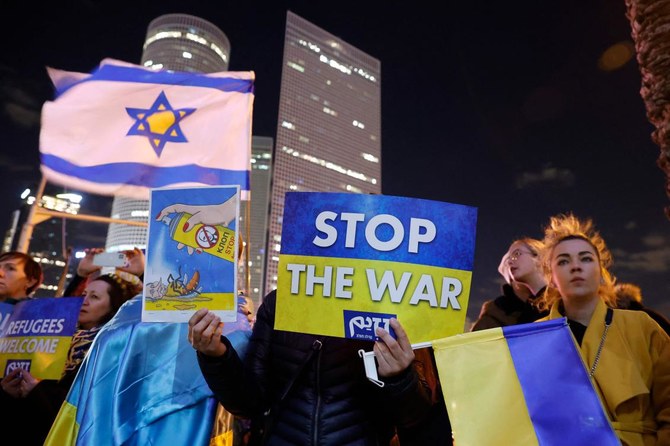LVIV, Ukraine/JERUSALEM: Ukraine voiced hope on Saturday for positive results from Israel’s bid to broker peace with Russia, denying a media report that suggested Israeli Prime Minister Naftali Bennett had tried to nudge Kyiv into caving to Moscow’s demands.
Bennett, acting at Ukraine’s behest, held a three-hour Kremlin meeting with Russian President Vladimir Putin last Saturday. He has since spoken twice with Putin by phone and four times with Ukrainian President Volodymyr Zelenskiy, officials say.
“I believe (Bennett) can play an important role, because Israel is a country with a lot of history and parallels (to our situation), as well as having a large migration of Jews from Ukraine, Russia, and Belarus,” Zelenskiy said in a briefing.
Earlier on Saturday, a top Ukrainian adviser denied a report carried by Israel’s Walla news, the Jerusalem Post and US news site Axios that had suggested, citing an unidentified Ukrainian official, that Bennett had urged Ukraine to give in to Russia.
Israel, “just as other conditional intermediary countries, does NOT offer Ukraine to agree to any demands of the Russian Federation,” the adviser, Mykhailo Podolyak, tweeted. “This is impossible for military & political reasons. On the contrary, Israel urges Russia to assess the events more adequately.”
A senior Israeli official, who requested anonymity due to the sensitivity of the matter, called the report “patently false.”
“At no point did Prime Minister Bennett advise President Zelenskiy to take a deal from Putin — because no such deal was offered to Israel for us to be able to do so,” the official said.
TALKS IN JERUSALEM?
Moscow has said little about Bennett’s mediation efforts. It has issued terms including that Ukraine recognize Crimea as Russian and Russian-backed breakaway areas as independent. Kyiv says it will not cede any territory.
One official briefed on the mediation, and who spoke to Reuters on condition of anonymity, envisaged a potential situation where the warring countries “put it (the recognition issue) on the side, perhaps for 10 or 15 years.”
As a possible precedent, the official cited the Soviet-Japanese peace pact of 1956 that left the status of disputed islands unresolved. It was not immediately clear if the remarks reflected wider thinking in Kyiv or Moscow.
Zelenskiy said he would be open to peace talks in Jerusalem, and anticipated Israel giving Ukraine security guarantees.
“I said to (Bennett) that at present it’s not constructive to hold meetings in Russia, Ukraine, or Belarus. These are not the places where we (the leaders of the involved countries) can agree to stop the war... Do I consider Israel, Jerusalem in particular, to be such a place? I think the answer is yes.”
The crisis diplomacy, coordinated with the United States, Germany and France, has been a high-wire act for Bennett.
He has left it to his foreign minister to condemn the Russian invasion in Israel’s name. That, said another official, was meant to keep Putin’s door open to the Israeli prime minister.
“Power in Russia is pooled entirely around this one man. It’s highly personal. Israel has managed relations with Russia through leader-to-leader contacts, and that requires avoiding soundbites that might stir up ill will,” the official said.
Citing the time that Putin and Zelenskiy have invested in speaking to — and through — Bennett, a senior official in Israel’s Foreign Ministry, Simona Halperin, said in a radio interview on Thursday the mediation efforts “certainly, certainly have a chance of succeeding.”
















